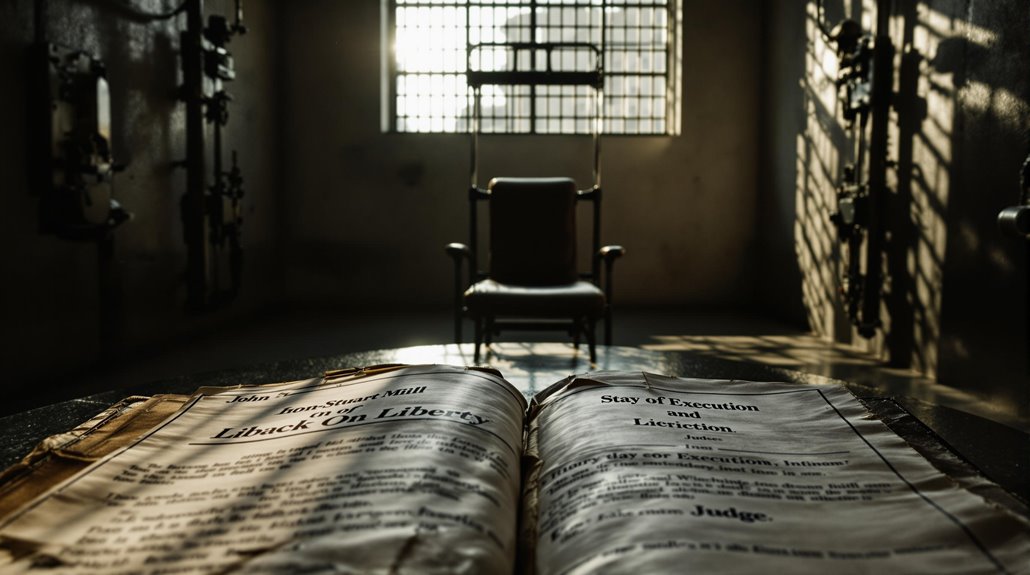You’ll find that libertarians are deeply divided on capital punishment, with their core principles creating inherent tension. While some argue it violates individual autonomy and grants dangerous power to the state, others view it as legitimate restitution for rights violations. The documented racial bias, 185+ death row exonerations since 1973, and $1.26 million additional cost per case raise serious concerns. The movement’s stance continues evolving as new evidence shapes the debate’s landscape.
Core Principles of Libertarian Philosophy and Capital Punishment

Despite its strong emphasis on individual rights, libertarian philosophy remains deeply divided on capital punishment. You’ll find that core libertarian ethics emphasize the non-aggression principle and property rights, creating a complex tension when it comes to state-sanctioned executions.
Some libertarians argue that the death penalty represents the ultimate violation of individual autonomy, while others view it as a legitimate response to those who’ve violated others’ rights.
The fundamental justice philosophy behind libertarian thought centers on proportional punishment and restitution.
You’re looking at a debate that pits the state’s role as an arbiter of justice against its potential for abuse of power. It’s a clash between retributive justice and the libertarian skepticism of government authority – a conflict that’s left the movement without a unified stance on this critical issue.
The Case Against State-Sanctioned Executions
While the state wields tremendous power over citizens’ lives, its authority to end them raises grave constitutional and practical concerns.
You’ll find that government-sanctioned executions create troubling ethical implications around irreversibility and institutional overreach. The finality of death leaves no room for error correction when new evidence emerges.
The moral considerations extend beyond individual cases to systemic issues.
You’re looking at a justice system with documented racial bias, where wealth often determines legal representation quality.
Consider that since 1973, over 185 death row inmates have been exonerated – a staggering indictment of the system’s fallibility.
When you examine the data, you’ll notice that states spend millions more prosecuting death penalty cases than life sentences, while failing to deliver promised closure to victims’ families.
Arguments Supporting Capital Punishment From a Libertarian Perspective
You’ll find that libertarian arguments favoring capital punishment often center on individual rights, particularly self-defense and property protection at their most extreme extension.
When examining restitution-based justice models, some libertarians contend that forfeit of the perpetrator’s life represents the only proportional compensation for murder.
Despite their general skepticism of state power, these libertarians argue that capital punishment, when strictly limited to the most egregious violations of individual rights, actually constrains government overreach by establishing clear boundaries for state intervention.
Self-Defense and Property Rights
Three core libertarian arguments favoring capital punishment stem from fundamental principles of self-defense and property rights. You’ll find that self-defense ethics justify lethal force when facing grave threats, while property rights extend to ownership of one’s life. These principles form the foundation for supporting state-sanctioned executions.
| Principle | Individual Right | State Authority |
|---|---|---|
| Self Defense | Right to protect life | Execute violent threats |
| Property Rights | Ownership of self | Protect citizen property |
| Restitution | Claim to justice | Enforce final penalties |
| Consent | Social contract | Maintain order |
When someone commits murder, they’ve violated both the victim’s self-ownership and right to life. By forfeiting their own rights through aggression, they’ve opened themselves to proportional response. This forms the basis for libertarian support of capital punishment as an extension of defensive rights.
Individual Restitution and Justice
Although restitution typically involves financial compensation, murder creates an irreparable debt that many libertarians argue can only be settled through capital punishment.
When a killer takes someone’s life, they’ve violated the most fundamental right – the right to exist. No amount of restorative justice or monetary victim compensation can truly make up for this loss.
Pure libertarian philosophy centers on the non-aggression principle and property rights, including self-ownership.
You’ll find that many libertarian theorists contend that forfeiting an aggressor’s life is the only proportional response to murder. They maintain that justice requires the perpetrator to pay the ultimate price, as they’ve permanently deprived another individual of their existence.
This creates a unique case where traditional compensatory measures fall short of true restitution.
Minimizing State Power Abuse
While advocating for capital punishment may seem at odds with limiting government power, libertarian proponents argue that a carefully constrained death penalty actually prevents state overreach.
You’ll find that requiring an exceptionally high burden of proof, multiple layers of appeals, and unanimous jury decisions creates a framework that restricts the state’s ability to wield this ultimate power arbitrarily.
Property Rights and Proportional Justice

Since property rights form the foundation of libertarian philosophy, the application of capital punishment raises complex questions about proportional justice and restitution.
You’ll find that many libertarians argue that one’s ultimate property right is self-ownership, making murder the gravest violation of property rights possible. This perspective suggests that execution could be a proportional response to murder.
Yet, you’ll need to reflect on how today’s justice systems can adequately determine appropriate compensation for loss of life. The challenge lies in balancing the victim’s violated property rights against the accused’s right to life.
Some libertarian scholars propose that financial restitution to victims’ families might better align with property rights principles than state-sanctioned execution. This creates tension between seeking justice and maintaining consistency with libertarian values of self-ownership.
Government Power and Irreversible Penalties
You must confront a troubling reality: the state maintains absolute control over life-and-death decisions through its monopoly on legal force.
When government executes citizens, it exercises an irreversible power that can’t be undone through appeals, new evidence, or compensation.
This concentration of final authority in state hands directly conflicts with libertarian principles of limited government and individual rights, especially given the documented cases of wrongful executions that have emerged through DNA evidence.
State Monopoly on Force
A core dilemma emerges when examining the state’s monopoly on lethal force through capital punishment.
You’ll find that giving the government exclusive power over life and death creates an unsettling paradox for libertarian principles. The very state control that libertarians typically oppose becomes amplified in its most extreme form.
Consider how force legitimacy, when granted solely to the state, contradicts the libertarian emphasis on individual rights and limited government authority.
You’re looking at a system where the same institution that libertarians don’t trust with healthcare or education holds absolute power over citizens’ lives.
This uncomfortable reality forces you to question whether any government, regardless of its checks and balances, should wield such irreversible authority.
Finality of Execution Orders
The irreversible nature of capital punishment creates an unmatched level of government power over individual life. Once executed, there’s no possibility for reversal, redress, or compensation if new evidence emerges.
You’re witnessing a system where finality implications extend far beyond the condemned individual, permanently affecting families, communities, and the justice system’s credibility.
Consider how the state’s authority to enforce irreversible consequences stands in stark contrast to other governmental powers, which typically allow for appeals, corrections, or restitution.
You’ll find that between 1973 and 2022, 190 death row inmates were exonerated – but only those still alive could reclaim their freedom.
Those executed remain dead, their innocence or guilt forever sealed, demonstrating how capital punishment grants the state an absolute, unchangeable form of control.
Limits to Government Authority
While advocates of capital punishment argue for its necessity, fundamental libertarian principles reject granting government such extreme, irreversible power over life and death.
You’ll find that government overreach in criminal justice directly threatens individual autonomy, especially when the state claims authority to end a citizen’s existence.
Consider the dangerous precedent – when you allow the state to execute its citizens, you’re accepting an expansion of government power that’s fundamentally at odds with libertarian values.
The same government that can’t efficiently manage the DMV shouldn’t hold the power of life and death.
You’re witnessing a critical contradiction: a system that claims to protect individual rights while simultaneously asserting the ultimate authority to violate the most fundamental right of all – the right to exist.
Cost Analysis: Public Resources and the Death Penalty
From a purely economic standpoint, maintaining capital punishment drains public resources at an alarming rate.
You’ll find that the cost efficiency of death penalty cases falls drastically below that of life imprisonment, with resource allocation favoring lengthy appeals and enhanced security measures.
Consider these staggering financial implications:
- Death penalty trials cost taxpayers an average of $1.26 million more than non-death penalty cases.
- Housing death row inmates requires specialized facilities, costing nearly triple the expense of general population inmates.
- The appeals process often stretches beyond a decade, requiring continuous funding for legal representation and court proceedings.
You’re paying for this system through your tax dollars, while studies consistently show that redirecting these funds to law enforcement and prevention programs would yield better public safety outcomes.
Alternative Approaches to Criminal Justice

Since traditional punitive approaches continue failing society, examining evidence-based alternatives to capital punishment reveals promising solutions.
You’ll find that rehabilitation models in Norway and Denmark show recidivism rates below 20%, compared to America’s staggering 60%. These programs prioritize education, mental health treatment, and vocational training over retribution.
Restorative justice practices offer another compelling path forward.
You’re looking at systems where offenders must directly confront their impact on victims and communities, while working to make meaningful amends. The data’s clear – jurisdictions implementing these programs see victim satisfaction rates above 80% and significant cost savings.
When you compare these outcomes to the death penalty’s astronomical costs and questionable deterrent effect, it’s evident that smarter alternatives exist for addressing violent crime.
Historical Evolution of Libertarian Death Penalty Positions
The Libertarian movement’s stance on capital punishment has undergone dramatic shifts since its American inception in the 1970s.
You’ll find that early libertarian thinkers focused heavily on the relationship between individual rights and state power, often wrestling with the ethical implications of government-sanctioned executions within their philosophical framework.
- Murray Rothbard’s 1978 position opposed state executions while supporting private restitution.
- The 1980s saw libertarian scholars split between retributive justice advocates and NAP purists.
- Post-2000 libertarians increasingly favor abolition due to DNA evidence revealing systemic flaws.
The historical context reveals a fascinating evolution in libertarian thought, as you’ve witnessed the movement shift from theoretical debates about state authority to practical concerns about wrongful convictions and irreversible punishment.
Modern libertarian perspectives now largely emphasize the dangers of giving the state power over life and death.
Conclusion
You’ll find that libertarian views on capital punishment remain complex and divided, reflecting core tensions between individual rights and state power. While some libertarians support the death penalty as proportional justice, others see it as an dangerous expansion of government authority. As you weigh these perspectives, consider how alternative approaches might better align with libertarian principles of limited government, personal freedom, and protecting property rights.





